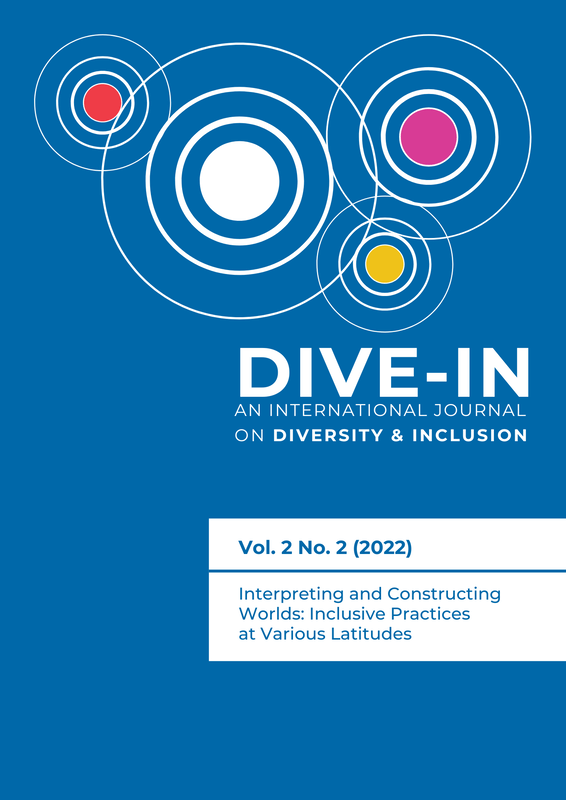Rettifiche per un linguaggio inclusivo: i segni dell’uguaglianza e della diversità nella lingua coreana
DOI:
https://doi.org/10.6092/issn.2785-3233/16134Keywords:
inclusive language, non-discriminatory language, gender equality, Korean languageAbstract
This work aims to draw the attention to the main linguistic issues produced by Korean society and to propose a reflection on non-discriminatory language, which is increasingly moving to an inclusive direction towards any individual or social group, attributing equal dignity and visibility to all. This present research intends to proceed with the collection of a corpus of terms and phrases of the Korean language in the description of persons or groups of individuals who may encounter the risk of discrimination. This work is based on the surveys carried out by the SFWF (Seoul Foundation of Women Family), established in 2002, and units selected will be analyzed with the aim of proposing the correction of terms representing a patriarchal society and strongly male chauvinist. The reflections of these research, therefore, invite to take small steps to contribute to a broader social understanding of respect.
References
An, Sangsu. Youngju Baek, Aekyeong Yang, Haeran Kang, & Jeongju Yun. 2007. Sahoejŏk ŭisa sot'ong yŏn'gu: sŏngch'abyŏljŏk ŏnŏ p'yohyŏn sarye chosa mit taean maryŏnŭl wihan yŏn'gu (Studi sulla comunicazione sociale: Indagini sulle forme linguistiche di discriminazione di genere e le soluzioni). Seoul: National Institute of Korean Language.
Cho, Taerin. 2006. Sahoejŏk ŭisasot'ong yŏn'gu - ch'abyŏljŏk pigaekkwanjŏk ŏnŏ p'yohyŏn kaesŏnŭl wihan kich'o yŏn'gu (Studi sulla comunicazione sociale – Primi studi per migliorare le forme linguistiche discriminanti e non obiettive). Seoul: National Institute of Korean Language.
Cho, Taerin. 2011. “Ch'abyŏljŏk ŏnŏ p'yohyŏn'gwa sahoe kaldŭngŭi munje” (Forme linguistiche discriminanti e conflitti sociali). Narasarang Journal 120, 388–410.
Guentherodt, Ingrid, Marlis Hellinger, Luise F. Pusch, Senta Trömel-Ploetz. 1980. “Richtlinien zur Vermeidung sexistischen Sprachgebrauchs.” Linguistische Berichte 69, 15–21.
Hellinger, Marlis. 1989. “Revising the patriarchal paradigm: Language change and feminist language politics”. In Ruth Wodak (ed.), Language, power and ideology. Studies in political discourse, 273–288. Amsterdam: John Benjamins.
Jung, Imsuk. 2018. Manuale di Lingua e linguistica coreana. Milano: Mimesis.
Jung, Imsuk. 2021. Grammatica della Lingua coreana: Morfologia e sintassi. Milano: Hoepli.
Kim, Soyoung. 2022. “Sŏngch'abyŏl ŏnŏwa taeanŏŭi sŏnggyŏk” (Caratteristiche del linguaggio discriminatorio e delle nuove forme proposte in sostituzione). The Journal of Korean Studies 64, 287–311.
Lakoff, Robin. 1973. Language and Woman’s place, Language and Society. New York: Harper and Row.
Lee, Jungbok. 2013. Han'guk sahoeŭi ch'abyŏl ŏnŏ (Il linguaggio discriminante della società coreana). Seoul: Sotong.
Lee, Jungbok. 2017. “Han'gugŏwa han'guk sahoeŭi ch'abyŏl p'yohyŏn” (La lingua coreana e le forme linguistiche discriminanti della società coreana). Saegugŏsaenghwal 27(3), 9–31.
Martinet, André. 1962. La considerazione funzionale del linguaggio. Trad. Giovanna Madonia. Bologna: Il Mulino.
Park, Cholwoo. 2018. Sahoejŏk sot'ongŭl wihan ŏnŏ chŏngch'aek yŏn'gu - ŏnŏ yejŏrŭl chungsimŭro (Studi sulle politiche linguistiche per la comunicazione sociale: Etica nell’educazione linguistica). Seoul: National Institute of Korean Language.
Robustelli, Cecilia. 2012. Linee guida per l’uso del genere nel linguaggio amministrativo: Progetto genere e linguaggio. Parole e immagini della comunicazione. Firenze: Comune di Firenze & Accademia della Crusca.
Sabatini, Alma. 1987. Il sessismo nella lingua italiana. Commissione Nazionale per la realizzazione della parità tra uomo e donna. Roma: Presidenza del Consiglio dei Ministri.
Wittgenstein, Ludwig. 1979. Tractatus logico-philosophicus e Quaderni 1914-1916. Torino: Einaudi.
Downloads
Published
How to Cite
Issue
Section
License
Copyright (c) 2022 Imsuk Jung

This work is licensed under a Creative Commons Attribution 4.0 International License.





